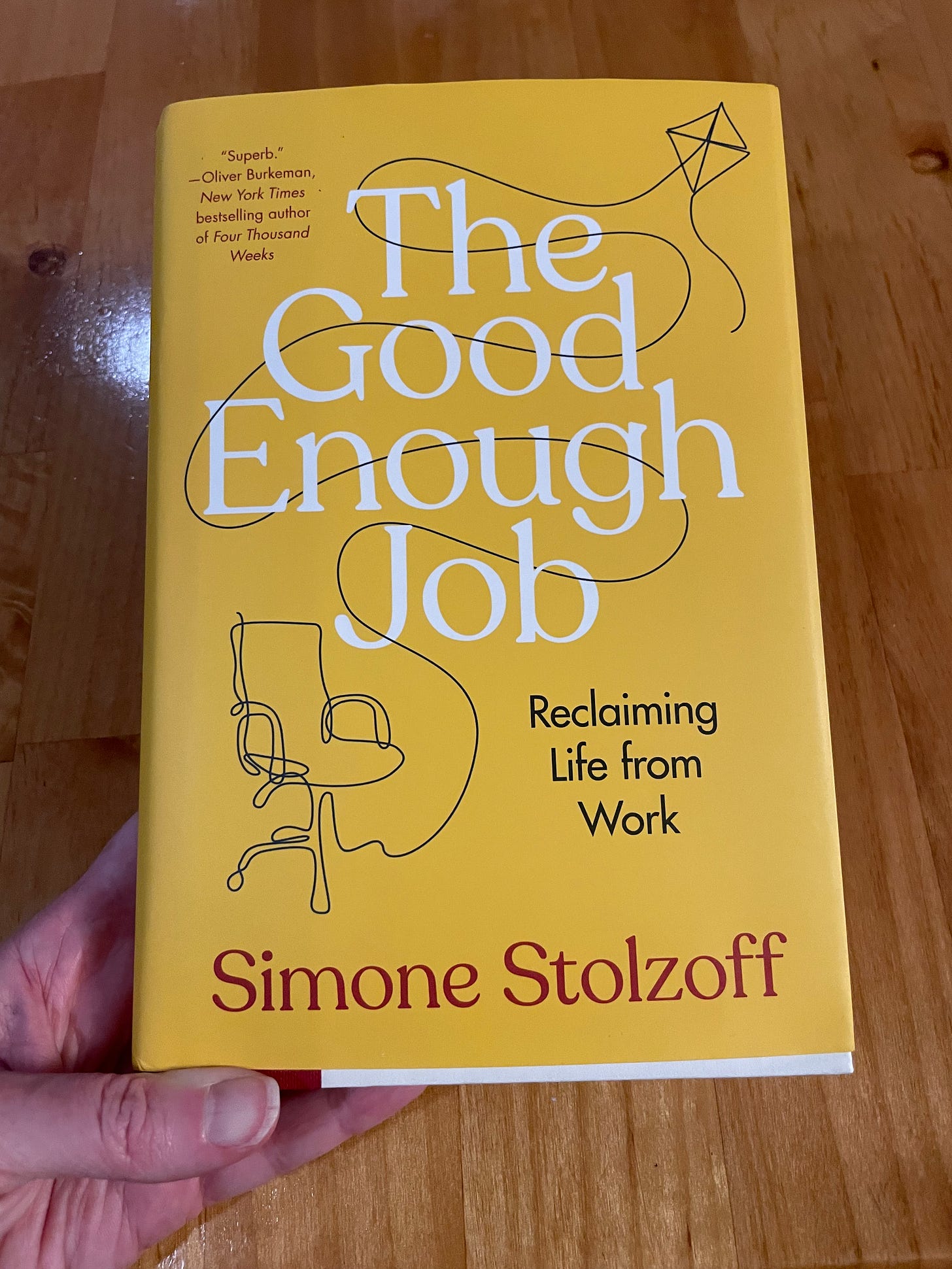When author Toni Morrison was a girl, she earned money cleaning a wealthier woman’s house. As Toni’s domestic skills increased, she gained outward approval and inward pride, followed by increasing responsibility. Lamenting the piling demands of her employer to her father, Toni’s father replied:
“Listen. You don’t live there. You live here. With your people. Go to work. Get your money. And come on home.”
This wisdom should guide us all, or at least be a contrasting voice in a culture revering career as identity, work as religion.
The Good Enough Job
Simone “Simo” Stolzoff shared this story in his new book The Good Enough Job. I connected with Simo in Paul Millerd’s Find the Others community, for people questioning or off the default career path. I was fortunate to get an advance digital copy of the book.
Simo opens the book with a story of his grandmother, who opened a coffee shop in her small town in Italy to support her family after her husband died. “She enjoyed her work at the coffee shop—loved it, even—but it did not define her.”
He shares his own career journey as a designer, journalist, and now author. Most of the book is a collection of stories he gathered while interviewing 100+ people. He chose to focus on stories of white-collar US workers. This profile of worker tends to work more even though they earn more (i.e. they don’t need to work more), and more often associates meaning with work.
Each chapter follows the story of a different person. Most immersed their entire being into a career to later become disenchanted or discarded. Reading each story, my own experience felt more validated. The book is more descriptive than prescriptive, supplementing these personal stories with some history and philosophy of work.
The book absorbed me. Even taking notes, I sped through it on my round trip flights between Dallas and California last month.
I identified with pieces of each story, but especially Chapter Four’s Megan Greenwell. She left a successful journalism career when her employer became increasingly corporate. I identified with the unsettled feeling she had after leaving her job. She described the urge to be productive every time she tried to relax, only to then feel guilty for not relaxing. I recall the same emotions.
The end of the chapter, when she describes how she was able to be with her family during and after a loss, moved me to tears. During her time off, she felt like she was the best friend she had ever been.
At one point during my sabbatical, I made a comment to my roommate about feeling like I should be contributing more to society. She said I was contributing so much by supporting her, my family, and my partner. She was right. A huge focus of my time off was being there for others. Why don’t we value these contributions the same way we value paid work?
Call to Action
Shortly after I read the advance copy, I had the pleasure of meeting Simo last month when he was visiting Dallas. I gushed a bit about the book. We shared more about our personal work stories, the challenges of being off the “default path”, and our hope for societal change.
I mentioned I had a few workaholic friends I wanted to order copies for. He cautioned me. We can’t force people to be ready for change. As each person featured in the book reached their own point of disillusionment, perhaps you haven’t reached yours. You don’t have to wait for a health crisis, a layoff, or an abusive boss. Your catalyst could be curiosity rather than crisis.
If you feel like you have an unhealthy relationship with work, even if we haven’t met:
I care about you, and please read this book. Or at least start with this podcast.
It would also be a great book for a recent college or high school graduate. It’s that time of year!
As years of pulling an espresso machine gave Simo’s grandmother a lifelong bulging bicep, our jobs shape us. Jobs may demand certain output, certain hours. However, we can control the level of identity, mental energy, and allegiance we give to that part of our lives.
That’s the key—work is part of our lives. We must guard against the culture that wants to make it the central force.






Thanks so much for treating my work with such care, Claire!